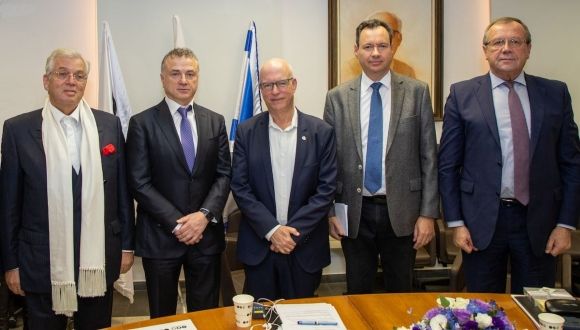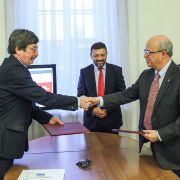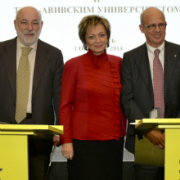30 Years of Russian-Israeli Diplomatic Ties Celebrated at TAU
Russian and Israeli diplomats, scholars and community leaders marked 30 years since the renewal of the countries’ diplomatic ties at a conference hosted by Tel Aviv University recently. The event included an overview of the history of their relations and highlighted joint projects in both the sciences and humanities that have flourished in recent years.
Russian-Israeli ties were officially broken in 1967 with the onset of the Six-Day War and then restored in 1991, after the break-up of the Soviet Union. Since then, TAU has maintained numerous partnerships with Russian universities and scholars, producing unique initiatives based on common cultural and historic roots.
“Our greatest achievement is that today we can openly discuss the history of our diplomatic relationship–its ups and downs. We have nothing to hide and we can learn from the past,” said Dr. Yacov Livne, Head of the Eurasian Department at Israel’s Foreign Ministry at the opening of the event.
One of the signs of the new openness and warmth between Russia and Israel is the decision to publish formerly classified archives of Soviet-Israeli diplomatic correspondence. The unique project is being carried out simultaneously in Russia and in Israel. TAU’s Dr. Boris Morozov of the Cummings Center for Russian and Easter-European Studies heads the project in Israel.
“Documents that will be published as part of this project will become textbook material for studying diplomatic crisis management and will allow us to contemplate the intense relations between the USSR and Israel in those years. We are very honored to support this important project,” said Dr. Michael Mirilashvili, TAU Governor and President of the Euro-Asian Jewish Congress.
Among documents planned for publication is the USSR telegram that led to the break-off of relations in 1967 and the 1989 directive on the “change of party line towards Israel,” signed by Soviet Secretary of State Mikhail Gorbachev. The project, supported by the Israeli Ministry of Foreign Affairs, the Euro-Asian Jewish Congress and the Russian Foreign Ministry, is set to be completed in 2023.
“The history of diplomatic relations between Russia and Israel shows us that dreams do come true. At the end of the 1980s, we couldn’t have even dreamed that the Russian Ambassador would sit here, at TAU, and tell us about the warm relations between our countries,” said Aaron Frenkel, TAU Governor and Chairman of the Board of the Euro-Asian Jewish Congress. He reminisced on his personal role in organizing the first direct flights for Soviet Jewish immigrants to Israel and added that there is more to be done to promote cooperation between the “best brains” of both countries.
Some of the most significant collaborations between TAU and Russian institutions in recent years include the 2018 Jewish Law Conference held in Moscow, organized by TAU and Moscow State University, and the upcoming Dibbuk Exhibition. The exhibition, which opens in February in Moscow, celebrates 100 years since the first performance of the famous play which became the signature piece of Israel’s veteran Habima Theater. It is a joint project of TAU’s Center for the Documentation of Performing Arts and Moscow’s Vakhtangov Theater.
“Our two countries enjoy a special connection based on a common cultural and scientific bond,” said TAU President, Prof. Ariel Porat. “We are looking into the possibility of creating a fund that would promote further cooperation between researchers in the two countries.”
Also speaking at the conference were Russian Ambassador to Israel Anatoly Viktorov as well as TAU professors Dr. Marina Niznik of the School of Foreign Languages and Dr. Lev Epplebaum of the Porter School of Environmental Studies.






